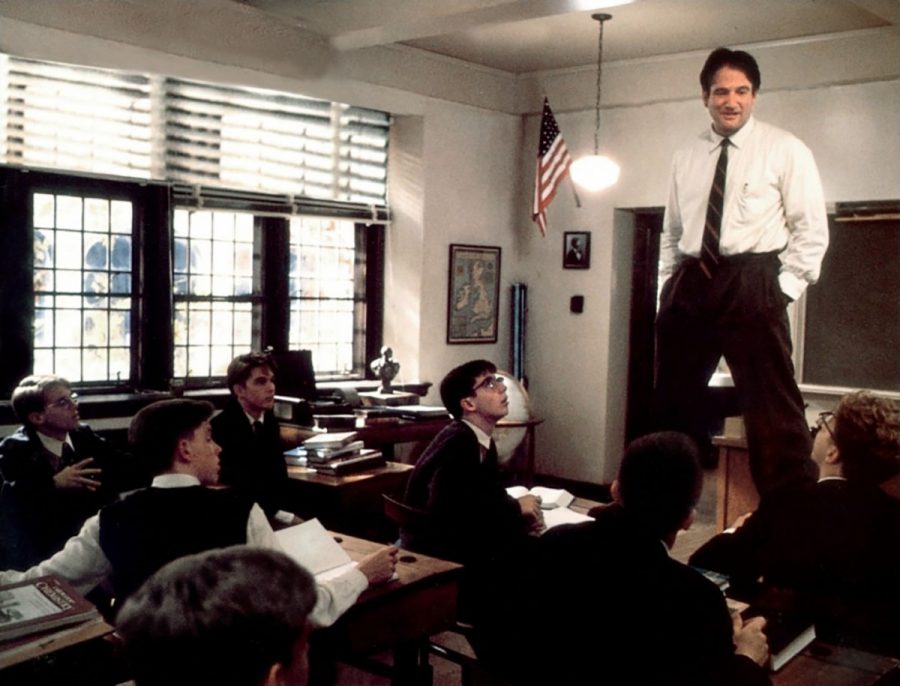‘Dead Poets Society’ in review
A story of high school-aged boys challenged with self-discovery through nontraditional teachings of poetry
More stories from Sydney Purpora
Photo by Submitted
The replacement professor for an English class taught at an all-male boarding school, John Keating (Robin Williams) teaches his students to live life to the fullest through poetry.
In the midst of harsh rules, predetermined daily schedules and rigorous coursework, a circle of friends experience a semester of prohibited acts and life changing lessons unheard of for a private preparatory school.
An coming-of-age gem, “Dead Poets Society” gives a glimpse into the lives of a group of young men enrolled in Welton Academy, a conservative, elite, all-male boarding school in Vermont, who find themselves passionately enthralled by intense literary work of rhyme and rhythm.
The film revolves around a group of returning students, Neil Perry (Robert Leonard), Knox Overstreet (Josh Charles), Richard Cameron (Dylan Kussman), Steven Meeks (Allelon Ruggiero), Gerard Pitts (James Waterston), and Charlie Dalton (Gale Hansen) and a new and timid student, Todd Anderson (Ethan Hawke) who are all enrolled in the same English class together.
Soon after semester commencement, the boys find out what they thought would be just another class, will open their eyes to the world around them in a new way. This different way of thinking is due to the replacement professor for their English class John Keating (Robin Williams) and his nontraditional yet impactful style of teaching poetry.
Upon first meeting, Keating playfully enters the room filled with his students awaiting instruction, whistling as he weaves in and out of the aisles all the way to the back of the room, where he pops the door open and continues to whistle his way out of the room. Poking his head back into the room of confused faces he said, “Well, come on, then” and the startled students grab their books and scurry to join him in the hall.
“O captain! My captain!” he said with a smile.
Keating introduces himself to the class quoting a poem written by Walt Whitman about Abraham Lincoln, telling his students to address him as Mr. Keating or, if they are more daring, “o captain, my captain.”
The first day of lecture, Keating has Perry read the preface of the poetry textbook which describes how to plot a poem’s “greatness” based a chart measuring both perfection and importance. He then proceeds to tell the boys to rip the whole introduction out because he believes mathematically measuring a poem based on only two factors demeans its intended impact.
Keating encourages his students to make their lives extraordinary and describes poetry as a powerful play with which each of his students will contribute a verse; the question is, what will their verse be?
Curious about his past, the boys discover Keating’s involvement in an unsanctioned club called the Dead Poets Society. Perry then decides to restart the club and the group of friends sneak off campus to a cave to read poetry and verse, restoring the club to its former glory of “sucking the marrow out of life.”
But the movie soon reveals not everyone was fond of the idea. Later in the movie, the tension between the school and the club intensify, and the boys have to work to keep the club a secret and fight to keep Keating on campus.
Throughout the movie, Keating helps his students through their hardships and pushes them to pursue their dreams. However, despite Keating’s advice and support by his friends, one of the members of the society, Perry is unable to cope with his family’s lack thereof.
Keating is able to get a group of boys who thought they were just taking another English class to learn about poetry, to not only understand more about the literary form but to fall in love with it as an expression of themselves. He challenges them to constantly look at life in a different light, strive to find their own voice and “seize the day” no matter where it may lead.
This movie will make you laugh, cry and reflect on your life journey like you never thought possible. “Dead Poets Society” has a way of reaching a wide range of viewers with its thick plot and intertwining character list.
Combining smooth yet intriguing transitions with wide-angle shots, Director Peter Weir set each scene and gave the plot a more intimate feel. Along with the alluring camera angles, I was captivated by the scoring, which effortlessly accompanied the writer Tom Schulman’s raw script.
No wonder this 1989 classic won Academy of Motion Picture Arts and Sciences Best Original Screenplay, British Academy of Film and Television Arts Best Original Film Score and French Academy of Cinema Best Foreign Film.
I give this movie five out of five stars because of its inspiring, thought-provoking story that will pull at your heartstrings and spark motivation within you to do what you love.
“Dead Poets Society” will be playing March 10-12 in Woodland Theater at the Davies Center.


